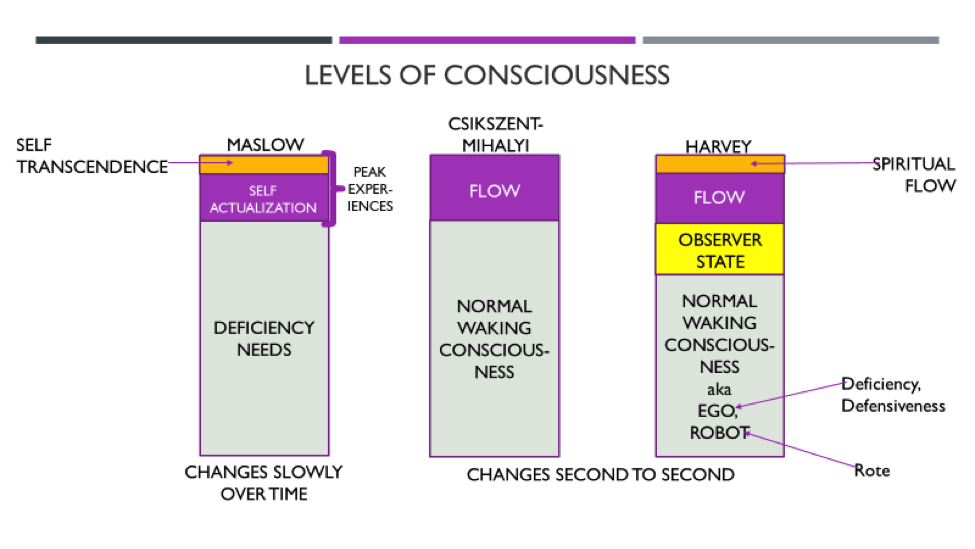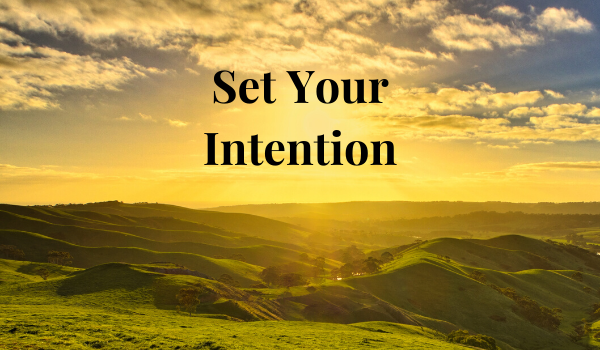Created December 17th, 2020
To recap recent posts, this series within Pebbles in the Pond, “On the Road to Flow”, is aimed at helping you establish yourself in the Observer state, so as to be able to spring into the Flow state more often. We kicked off the series by reviewing the work of Abraham Maslow, who identified the existence of these higher states of consciousness, which he called “peak experiences”. We then introduced the work of Mihaly Czikszentmihalyi, who identified a higher state that Maslow had not alluded to directly but which ought to fall within Maslow’s definition of peak experiences. This he called the Flow state, and it is characterized by perfect action doing itself and a disappearance of the difference between self and other, a unity of self with the entire experience bubble (as I call it).
I introduced my additional higher state I call the Observer state, which appears to be the first step on the ladder upward from normal waking consciousness. I provided some preliminary takeaways about how to know when you are in the Observer state, and how not to immediately kick yourself out of the Flow or Observer states when you get there. After this post we shall turn from theory to practice: takeaways helpful to getting into and staying in these higher states.
I promised at the end of the prior post to discuss one more eminent philosopher of psychology in this issue, and because I used the hint “Ego” many of you probably knew I was going to talk about Freud.
To Sigmund Freud, when we are born, the original self we are is the Id, an animal-like mentality devoid of conscience, and the Ego arises as a mediator the first time our needs are not immediately cared for. Later we gain a Superego by being taught what civilization expects of us, that is the conscience.
I agree with Freud about a few things, and differ about a few. (Of course, what do I know, I am only talking about my own experience, a sample of one.) I agree with Freud that there is “The Me That Was Born”. To me, that is the Observer, the True Self, the Essence, the Witness, The Experiencer, Who We Really Are. To me it does not have conscience nor lack conscience, it is pure of such considerations, but intuitively loves and protects everything. So, quite unlike Freud’s description of the id, the original you-ness is neither animal-like nor intrinsically selfish, in my estimation: it is the pure experiencer, consciousness itself. On the other hand, I agree with Freud’s writings about the source and nature of the Ego and feel that the Superego is part of the Ego.
To me, the Ego consists of the neuronal connections the brain makes, starting when the individual begins to have experiences. Freud likens it to a manager but I think of it more as a press agent, and that’s close enough to know Freud and I are both talking about the same thing.
What I am saying is that the protein constructions the brain builds are the Ego and Superego. The True Self is The Observer that was born. When we get into the Observer state, we are residing in and acting from the Me That Was Born. At all other times, the Observer, The True Self, is merely along for the ride, watching and identifying with the modulations of the mind and feelings generated by the neuronal net the brain has built in a “machine learning” way from internalizing and learning from our experiences.
My hypothesis is that the Ego we think we are is actually like a bio-AI. A robotical system we have become falsely identified with over time, starting from the original terror we felt upon noting our own helplessness and lack of understanding at a world that could and often did hurt us. This subsentience became our tour guide and we trusted it to take care of us. We had no idea how it would enslave us. In the average moment, the average person believes this AI is the self.
What does this mean for you?
You will know you’re not in the Observer state (nor in any higher state) if you are experiencing even mild negative emotion, making judgments that are critical of people or things, rating your own performance – the list goes on and we will cover all of it in this series. These experiences are “tells” that you are centered in your Ego – that built-up defensive self that you were not born with but is now a network of real physical neurons in your brain. In my estimation this evolutionary development is not a positive survival factor – even when we need to protect ourselves the Ego just seems to make things worse – whereas staying out of Ego would make you more formidable and effective in your own self-defense.
Your sense of self (I call “Your You-Ness”) can be in one of two places:
- Your true self that was born, which is an observer not obsessively attached to what is going on in experience bubble. The Observer enjoys an intrinsic sense that everything will work itself out and it therefore stays cool. That is where you want your You-ness to reside. And the locus of your You-ness, your sense of self, is controllable, but much trickier than riding a bicycle.
- Your Ego, or robot, a mechanistic and deterministic response of a neuronal net biological AI in your brain which evolution thought might be helpful. Science has observed in many species that evolution produces dead ends sometimes.
Takeaways:
- Keep your sense of self apart from the thoughts, feelings, and images rolling through you. Observe those ephemera and decide if there are gems of wisdom in there anywhere which could be actionable in your current life situation, and let the rest go by.
- Especially let any annoying thoughts go by, those are definitely the Ego. It can only help you as an alarm clock does, by pointing out that deep down inside a few things are bugging you. Write those down and when you feel like it, look at the bug list dispassionately as if these were concerns one of your children or mentees brought you, asking you to make it better. Intelligently and without excessive caring determine what your best advice will be to your Ego-self.
To be continued.
My best to all,
Bill
Follow my regular media blog, In Terms of ROI at Media Village. Here is the link to my latest post.



